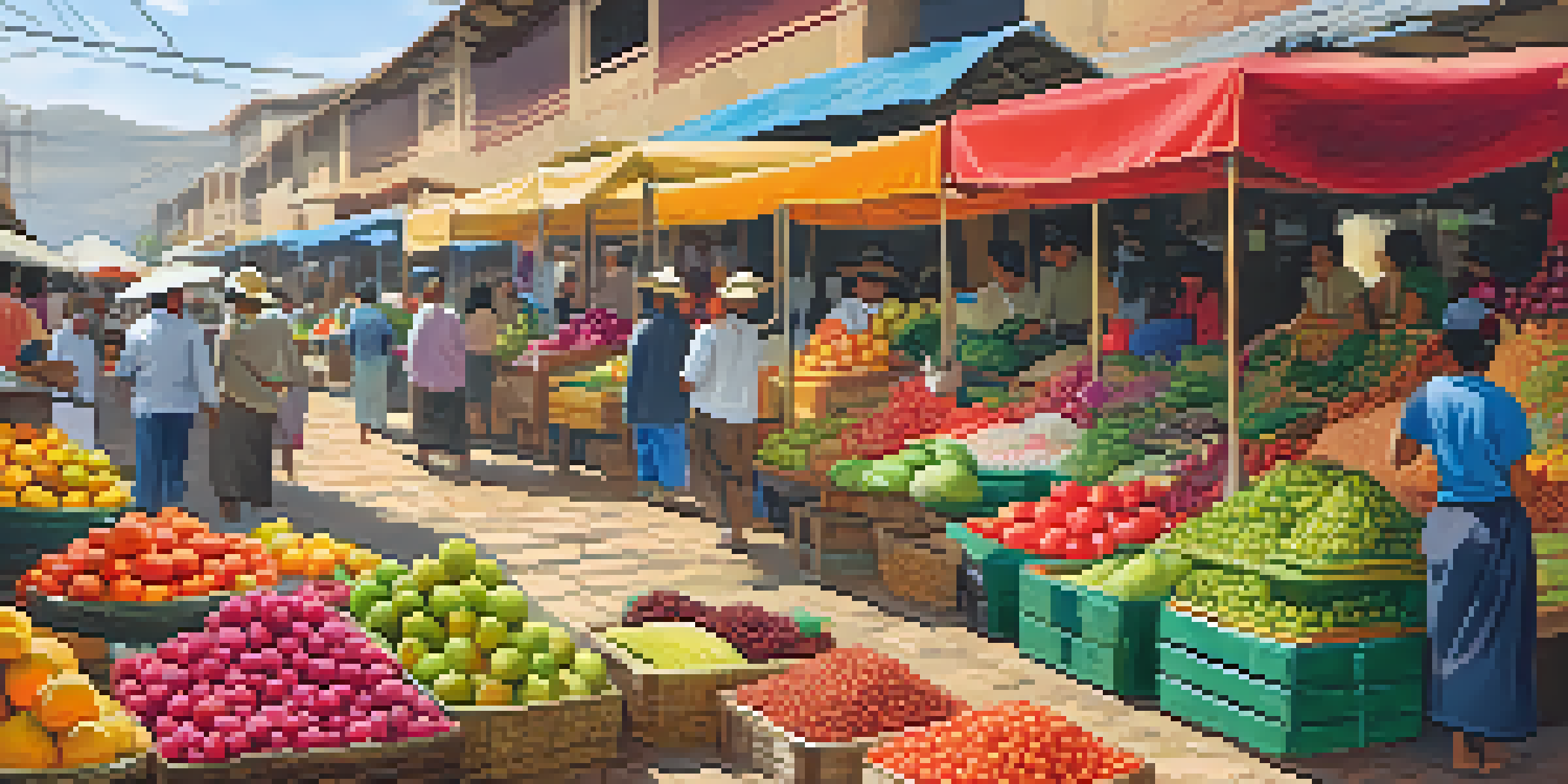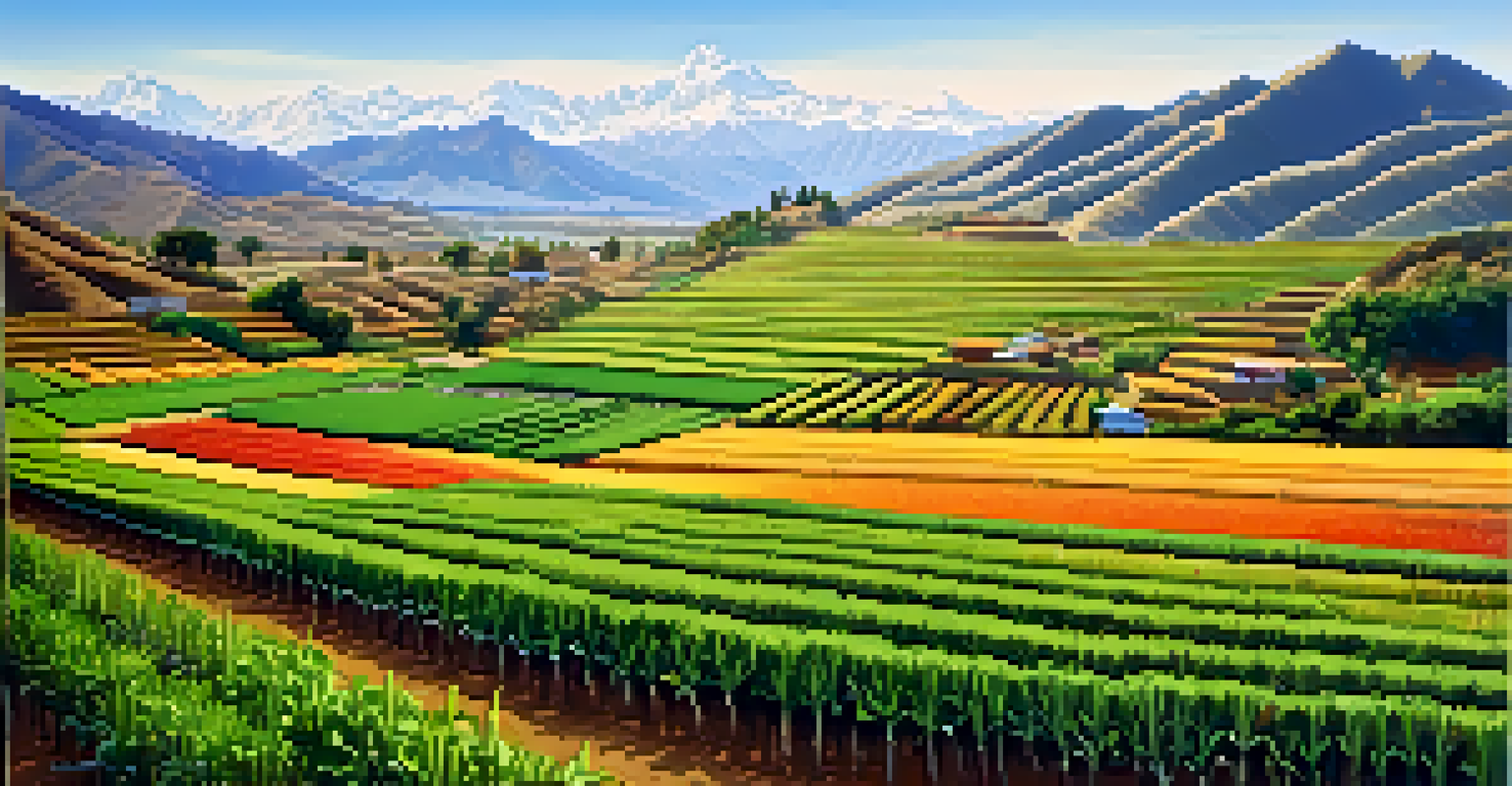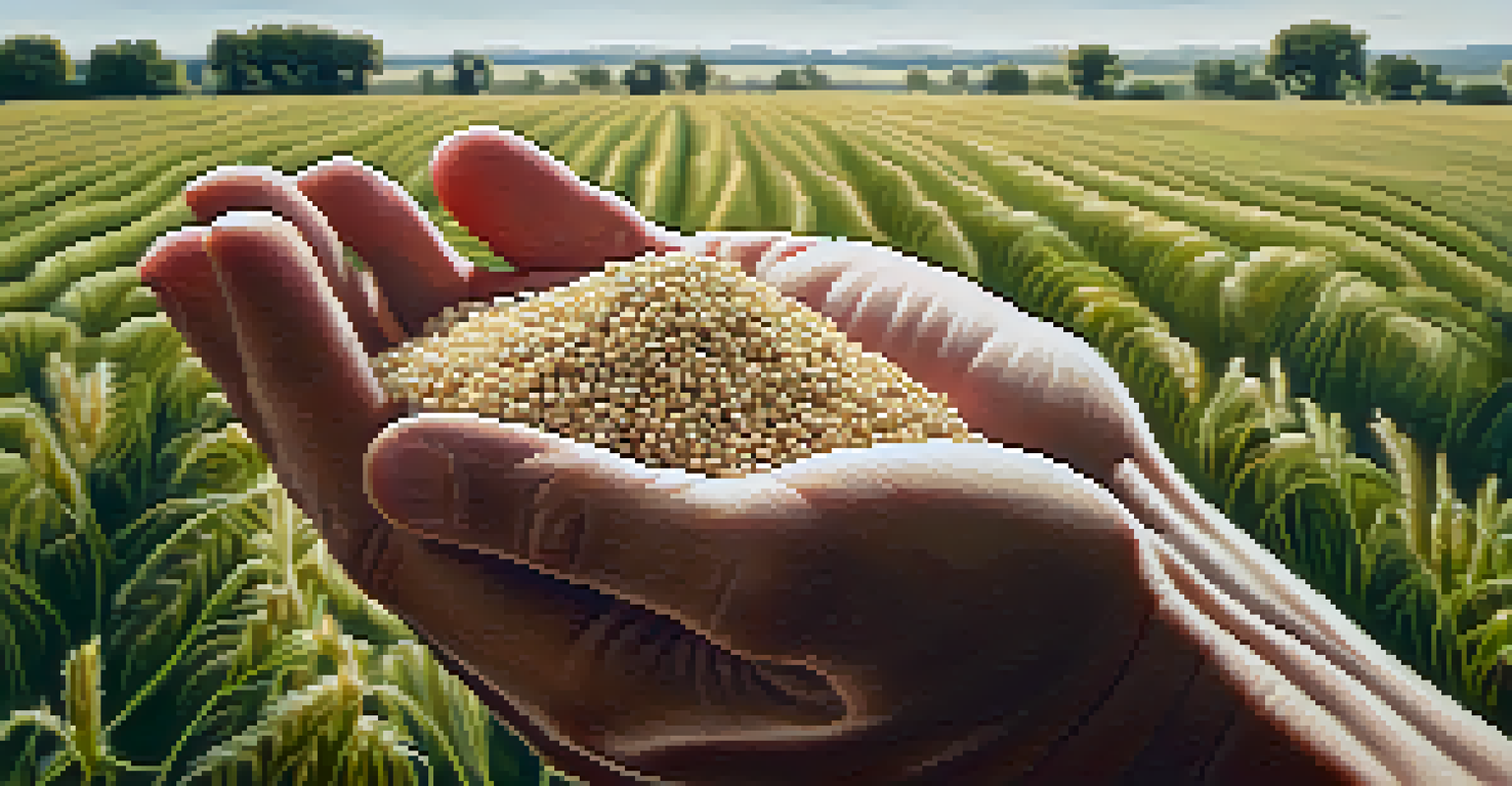Agricultural Exports: Peru's Contribution to Global Markets

Overview of Peru's Agricultural Exports
Peru has emerged as a significant player in the global agricultural market, thanks to its diverse climate and rich soil. This South American country boasts a unique geography that allows for the cultivation of a wide range of crops, from tropical fruits to high-altitude grains. As a result, Peru's agricultural exports have seen remarkable growth over the years, making it a vital contributor to food security around the world.
Agriculture is the foundation of our economy, and sustainable practices are essential for our future.
The country's agricultural sector not only supports local economies but also plays a crucial role in international trade. With a strategic focus on sustainable practices and quality production, Peru has positioned itself as a reliable supplier to various markets. This not only benefits Peruvian farmers but also enhances the global supply chain, ensuring that consumers have access to fresh and nutritious products.
In recent years, Peru's agricultural exports have expanded beyond traditional markets. As demand for organic and exotic products rises, Peru has adapted by investing in innovative farming techniques and diversifying its export portfolio. This adaptability has allowed Peru to remain competitive and responsive to changing global trends.
Key Agricultural Products Exported by Peru
Peru is known for exporting a variety of agricultural products, with some of the most notable being avocados, asparagus, and quinoa. The country has become the world's largest exporter of avocado, capitalizing on the growing appreciation for this nutritious fruit. Likewise, Peru's asparagus exports have gained international acclaim, especially in markets like the United States and Europe.

Quinoa, often touted as a superfood, has also put Peru on the map. Originally cultivated by the Incas, this ancient grain has seen a surge in global popularity due to its health benefits and versatility. By promoting quinoa as a staple in health-conscious diets, Peru has successfully positioned itself as a leader in this niche market.
Peru's Agricultural Growth
Peru has become a key player in global agricultural exports, leveraging its diverse climate and innovative practices.
Additionally, Peru exports a range of exotic fruits such as dragon fruit and cherimoya, which have captivated consumers worldwide. These unique offerings not only diversify Peru's agricultural exports but also enhance the country's culinary reputation on the global stage.
The Role of Agriculture in Peru's Economy
Agriculture is a cornerstone of Peru's economy, providing livelihoods for millions of people. Approximately one-third of the country's population is engaged in agricultural activities, making it one of the largest sectors in terms of employment. This sector contributes significantly to Peru's GDP, underscoring its importance in driving economic growth.
Trade is the engine of growth, and we must ensure that all farmers, large and small, benefit from it.
Moreover, agricultural exports serve as a critical source of foreign exchange for the country. As the global demand for food increases, Peru stands to benefit from its position as a key exporter. This influx of revenue helps fund public services and infrastructure development, further enhancing the quality of life for Peruvians.
The government's support for the agricultural sector has also played a pivotal role. Through investments in technology and training, Peru is empowering farmers to adopt modern practices that boost productivity and sustainability. This progressive approach not only strengthens the economy but also promotes environmental stewardship.
Challenges Faced by Peruvian Farmers
Despite its successes, Peru's agricultural sector faces several challenges that could hinder future growth. Climate change poses a significant threat, as changing weather patterns can affect crop yields and food security. Farmers must adapt to these shifts to ensure the sustainability of their practices and the stability of their livelihoods.
Additionally, access to technology and resources can be limited for small-scale farmers. Many lack the financial means to invest in modern equipment or sustainable practices, which can impact their competitiveness in the global market. Addressing these disparities is crucial for the long-term health of Peru's agricultural landscape.
Challenges for Farmers
Peruvian farmers face significant challenges, including climate change, access to technology, and complex trade regulations.
Trade regulations and tariffs imposed by importing countries can also create hurdles for Peruvian exports. Navigating these complex international trade rules requires strategic planning and collaboration, as it can affect profit margins and market access. Ensuring that Peruvian farmers are equipped to handle these challenges is essential for maintaining their foothold in global markets.
Sustainable Practices in Peruvian Agriculture
Sustainability has become a buzzword in agriculture, and Peru is taking strides to incorporate environmentally friendly practices. Many farmers are adopting organic farming methods, which not only benefit the environment but also appeal to the growing number of health-conscious consumers. This shift towards sustainability enhances Peru's reputation as a producer of high-quality agricultural products.
Furthermore, initiatives aimed at reducing water usage and improving soil health are gaining traction. By implementing drip irrigation systems and crop rotation, farmers can optimize their resources while minimizing their ecological footprint. These practices are essential for ensuring that Peru's agricultural sector can thrive in the face of climate challenges.
The government's commitment to promoting sustainable agriculture is evident in various programs designed to support farmers. Educational workshops and incentives for adopting eco-friendly practices encourage a culture of sustainability that benefits both producers and consumers. In this way, Peru is not only contributing to global markets but also leading by example in sustainable agriculture.
Peru's Trade Agreements and Their Impact
Peru has actively pursued trade agreements that bolster its agricultural exports, allowing it to open new markets and increase competitiveness. These agreements, such as the Free Trade Agreement with the United States and the European Union, have significantly reduced tariffs on Peruvian agricultural products. This has made it easier for Peruvian farmers to access lucrative markets and sell their goods at competitive prices.
The benefits of these trade agreements extend beyond just financial gains. They also promote knowledge exchange and collaboration between countries, allowing Peruvian farmers to learn best practices from their international counterparts. This exchange of ideas can lead to innovations that improve crop quality and yield, further enhancing Peru's position in global markets.
Sustainability in Agriculture
The shift towards sustainable farming practices is enhancing Peru's reputation and ensuring long-term agricultural viability.
However, it's essential to ensure that these agreements are equitable and support small-scale farmers. While larger agribusinesses may reap most of the benefits, efforts must be made to include smallholders in the trade process. By doing so, Peru can ensure that the advantages of international trade are shared more broadly across its agricultural community.
The Future of Peru's Agricultural Exports
Looking ahead, the future of Peru's agricultural exports appears promising, driven by innovation and adaptability. As global consumer preferences shift towards healthier and more diverse food options, Peru is well-positioned to meet this demand. By continually investing in research and development, the country can remain at the forefront of agricultural trends.
Moreover, the emphasis on sustainability will play a crucial role in shaping the future of Peruvian agriculture. As consumers become more environmentally conscious, products that are sustainably sourced will gain a competitive edge in the market. Peru's commitment to sustainable practices will not only benefit its farmers but also resonate with global consumers seeking responsible choices.

Ultimately, fostering collaboration between the government, farmers, and the private sector will be essential for navigating future challenges. By working together, Peru can create a resilient agricultural sector that thrives in the global marketplace. This collective effort will ensure that Peru continues to be a vital contributor to global agricultural exports for years to come.